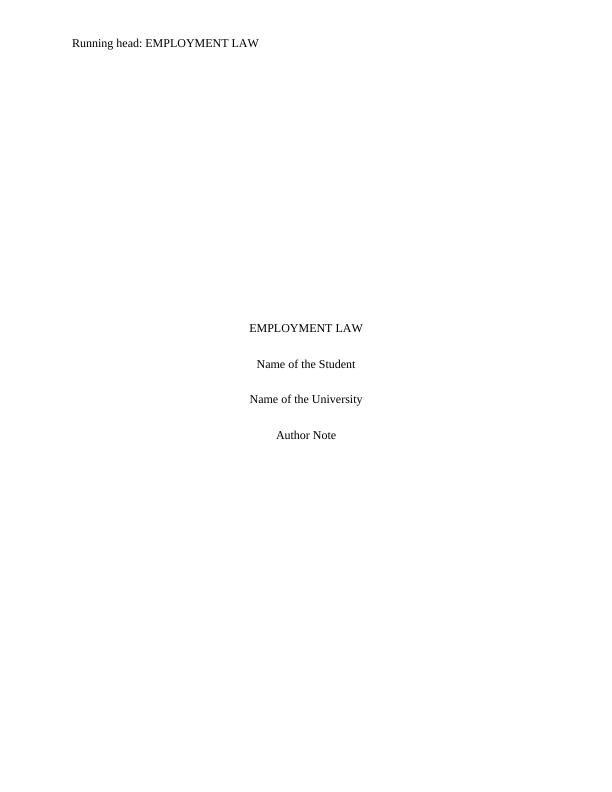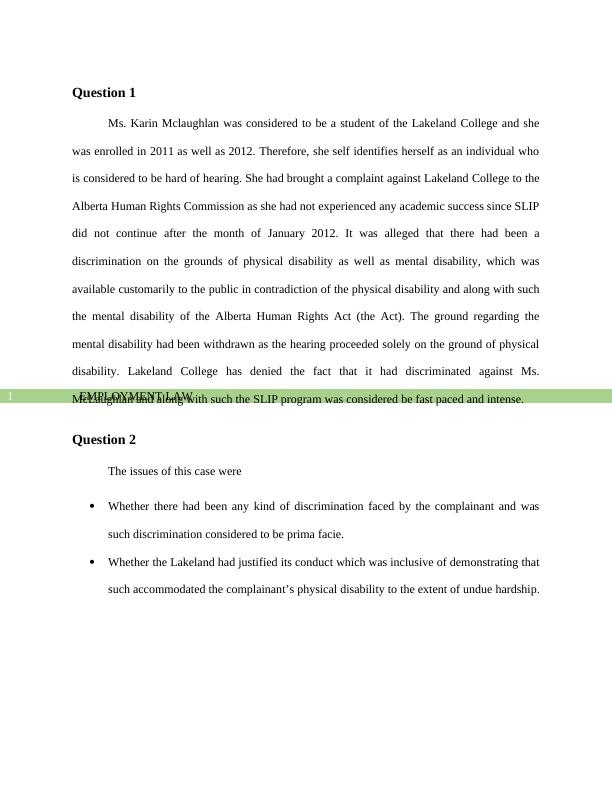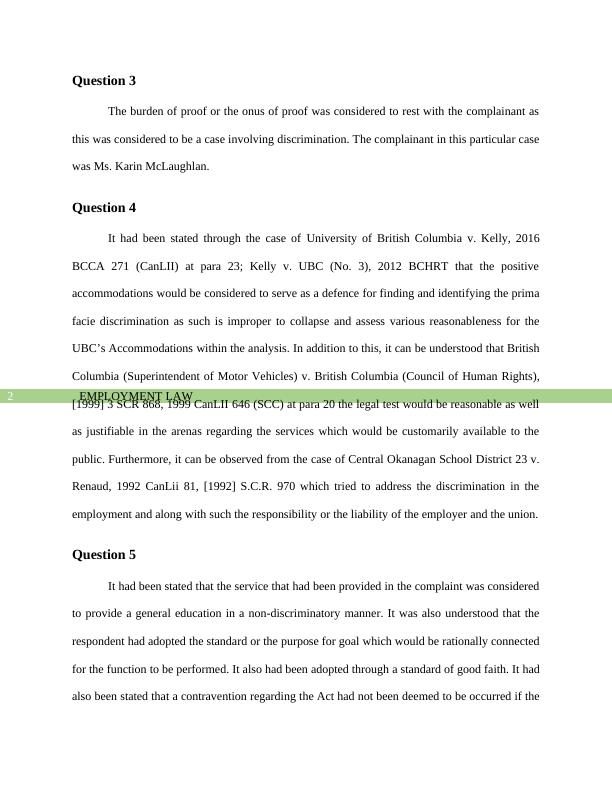EMPLOYMENT LAW AND ITS SIGNIFICANCE
Added on 2022-08-23
6 Pages1072 Words14 Views
Running head: EMPLOYMENT LAW
EMPLOYMENT LAW
Name of the Student
Name of the University
Author Note
EMPLOYMENT LAW
Name of the Student
Name of the University
Author Note

EMPLOYMENT LAW1
Question 1
Ms. Karin Mclaughlan was considered to be a student of the Lakeland College and she
was enrolled in 2011 as well as 2012. Therefore, she self identifies herself as an individual who
is considered to be hard of hearing. She had brought a complaint against Lakeland College to the
Alberta Human Rights Commission as she had not experienced any academic success since SLIP
did not continue after the month of January 2012. It was alleged that there had been a
discrimination on the grounds of physical disability as well as mental disability, which was
available customarily to the public in contradiction of the physical disability and along with such
the mental disability of the Alberta Human Rights Act (the Act). The ground regarding the
mental disability had been withdrawn as the hearing proceeded solely on the ground of physical
disability. Lakeland College has denied the fact that it had discriminated against Ms.
McLaughlan and along with such the SLIP program was considered be fast paced and intense.
Question 2
The issues of this case were
Whether there had been any kind of discrimination faced by the complainant and was
such discrimination considered to be prima facie.
Whether the Lakeland had justified its conduct which was inclusive of demonstrating that
such accommodated the complainant’s physical disability to the extent of undue hardship.
Question 1
Ms. Karin Mclaughlan was considered to be a student of the Lakeland College and she
was enrolled in 2011 as well as 2012. Therefore, she self identifies herself as an individual who
is considered to be hard of hearing. She had brought a complaint against Lakeland College to the
Alberta Human Rights Commission as she had not experienced any academic success since SLIP
did not continue after the month of January 2012. It was alleged that there had been a
discrimination on the grounds of physical disability as well as mental disability, which was
available customarily to the public in contradiction of the physical disability and along with such
the mental disability of the Alberta Human Rights Act (the Act). The ground regarding the
mental disability had been withdrawn as the hearing proceeded solely on the ground of physical
disability. Lakeland College has denied the fact that it had discriminated against Ms.
McLaughlan and along with such the SLIP program was considered be fast paced and intense.
Question 2
The issues of this case were
Whether there had been any kind of discrimination faced by the complainant and was
such discrimination considered to be prima facie.
Whether the Lakeland had justified its conduct which was inclusive of demonstrating that
such accommodated the complainant’s physical disability to the extent of undue hardship.

EMPLOYMENT LAW2
Question 3
The burden of proof or the onus of proof was considered to rest with the complainant as
this was considered to be a case involving discrimination. The complainant in this particular case
was Ms. Karin McLaughlan.
Question 4
It had been stated through the case of University of British Columbia v. Kelly, 2016
BCCA 271 (CanLII) at para 23; Kelly v. UBC (No. 3), 2012 BCHRT that the positive
accommodations would be considered to serve as a defence for finding and identifying the prima
facie discrimination as such is improper to collapse and assess various reasonableness for the
UBC’s Accommodations within the analysis. In addition to this, it can be understood that British
Columbia (Superintendent of Motor Vehicles) v. British Columbia (Council of Human Rights),
[1999] 3 SCR 868, 1999 CanLII 646 (SCC) at para 20 the legal test would be reasonable as well
as justifiable in the arenas regarding the services which would be customarily available to the
public. Furthermore, it can be observed from the case of Central Okanagan School District 23 v.
Renaud, 1992 CanLii 81, [1992] S.C.R. 970 which tried to address the discrimination in the
employment and along with such the responsibility or the liability of the employer and the union.
Question 5
It had been stated that the service that had been provided in the complaint was considered
to provide a general education in a non-discriminatory manner. It was also understood that the
respondent had adopted the standard or the purpose for goal which would be rationally connected
for the function to be performed. It also had been adopted through a standard of good faith. It had
also been stated that a contravention regarding the Act had not been deemed to be occurred if the
Question 3
The burden of proof or the onus of proof was considered to rest with the complainant as
this was considered to be a case involving discrimination. The complainant in this particular case
was Ms. Karin McLaughlan.
Question 4
It had been stated through the case of University of British Columbia v. Kelly, 2016
BCCA 271 (CanLII) at para 23; Kelly v. UBC (No. 3), 2012 BCHRT that the positive
accommodations would be considered to serve as a defence for finding and identifying the prima
facie discrimination as such is improper to collapse and assess various reasonableness for the
UBC’s Accommodations within the analysis. In addition to this, it can be understood that British
Columbia (Superintendent of Motor Vehicles) v. British Columbia (Council of Human Rights),
[1999] 3 SCR 868, 1999 CanLII 646 (SCC) at para 20 the legal test would be reasonable as well
as justifiable in the arenas regarding the services which would be customarily available to the
public. Furthermore, it can be observed from the case of Central Okanagan School District 23 v.
Renaud, 1992 CanLii 81, [1992] S.C.R. 970 which tried to address the discrimination in the
employment and along with such the responsibility or the liability of the employer and the union.
Question 5
It had been stated that the service that had been provided in the complaint was considered
to provide a general education in a non-discriminatory manner. It was also understood that the
respondent had adopted the standard or the purpose for goal which would be rationally connected
for the function to be performed. It also had been adopted through a standard of good faith. It had
also been stated that a contravention regarding the Act had not been deemed to be occurred if the

End of preview
Want to access all the pages? Upload your documents or become a member.
Related Documents
Occupational Health and Safety Act - Doclg...
|6
|1000
|60
Andruski v. Coquitlam School District and another, 2015 BCHRT 74lg...
|5
|656
|434
